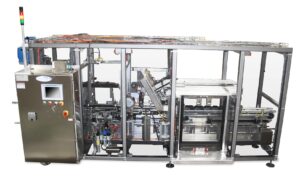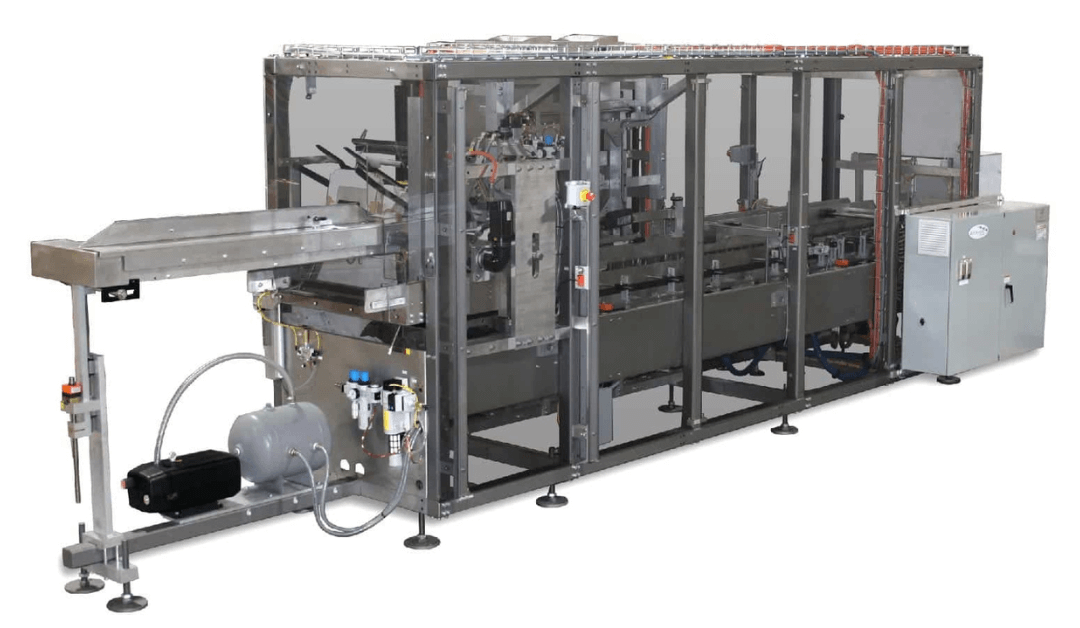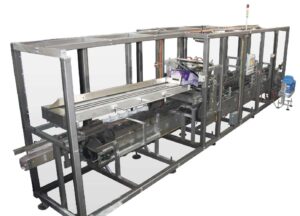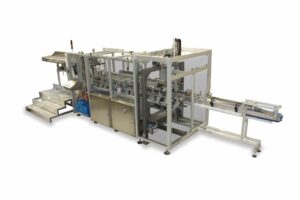Packaging is more than just a way to protect products. It’s a critical aspect of branding, marketing, and customer satisfaction. In today’s competitive market, the efficiency and effectiveness of packaging processes can make or break a business. This is where modern cartoners come into play, revolutionizing the packaging industry.
What is a Cartoner?
A cartoner, also known as a cartoning machine, is a piece of automated equipment used in the packaging process. It forms cartons, fills them with products, and seals them for distribution. This machinery is indispensable in various industries, including food and beverage, pharmaceuticals, cosmetics, and household goods.
Key Functions of Cartoners
- Forming Cartons: Cartoners take flat, pre-cut pieces of cardboard and fold them into the desired carton shape.
- Filling Cartons: The machine then inserts products into the formed cartons. This can range from bottles and tubes to sachets and blister packs.
- Sealing Cartons: Finally, the cartoner seals the carton, ensuring the product inside is secure and ready for shipping.
Types of Cartoners

Modern cartoners come in various types, each designed to meet specific packaging needs. Understanding these types can help businesses choose the right machine for their operations.
Horizontal Cartoners
Horizontal cartoners are designed to handle products that are placed into cartons horizontally. They are ideal for packaging items like bottles, cans, and jars. These machines are highly versatile and can handle a wide range of product shapes and sizes.
Vertical Cartoners
Vertical cartoners, on the other hand, are used for products that need to be placed into cartons vertically. These are often used for granular or powdered products, such as cereals, coffee, or pharmaceuticals. Vertical cartoners are known for their efficiency and precision in filling.
Top-Load Cartoners
Top-load cartoners are designed for applications where products are loaded from the top. This type of cartoner is suitable for delicate items or those that require careful handling during packaging. They are often used in the food industry for packaging items like frozen meals or bakery products.
Wrap-Around Cartoners
Wrap-around cartoners are specialized machines that wrap a carton around the product. This type of cartoner is perfect for packaging items that need a snug fit, such as multipacks of beverages or canned goods. Wrap-around cartoners provide a high level of stability and protection for the products inside.
Benefits of Using Modern Cartoners
Increased Efficiency
Modern cartoners streamline the packaging process, reducing the time and labor required for manual packaging. This leads to faster production cycles and the ability to meet higher demand without compromising quality.
Cost Savings
Automating the packaging process with cartoners can lead to significant cost savings. Businesses can reduce labor costs, minimize packaging material waste, and lower the risk of product damage during packaging, all of which contribute to a healthier bottom line.
Enhanced Product Safety
Modern cartoners ensure that products are securely packaged, protecting them from contamination and damage during transportation and storage. This is especially crucial for industries like food and pharmaceuticals, where product integrity is paramount.
Consistent Quality
With precise control over the packaging process, modern cartoners ensure consistent quality across all packaged products. This consistency is essential for maintaining brand reputation and customer satisfaction.
Flexibility and Scalability
Modern cartoners can be easily adjusted to accommodate different product sizes and packaging requirements. This flexibility makes it easier for businesses to scale their operations and adapt to changing market demands.
How Modern Cartoners Work
Carton Erecting
The process begins with the machine erecting flat carton blanks into their box shape. This step involves precise folding and forming to create a sturdy base for the products.
Product Loading
Once the cartons are formed, the products are loaded into them. This can be done manually or automatically, depending on the specific setup of the cartoner. Automatic loading systems use robotic arms or conveyor belts to place products into the cartons efficiently.
Carton Sealing
After the products are loaded, the cartoner seals the cartons using glue or other sealing methods. This step ensures that the cartons are securely closed, ready for labeling and distribution.
Choosing the Right Cartoner for Your Business
Assessing Your Packaging Needs
Before investing in a modern cartoner, it’s essential to evaluate your specific packaging needs. Consider factors such as the types of products you package, production volume, and the desired level of automation.
Evaluating Cartoner Features
Look for cartoners with features that align with your business requirements. Key features to consider include speed, versatility, ease of use, and maintenance requirements. It’s also beneficial to choose a cartoner with a user-friendly interface and robust support from the manufacturer.
Considering Future Growth
When selecting a cartoner, think about your long-term business goals. Choose a machine that can scale with your operations and accommodate future packaging needs. Investing in a flexible and adaptable cartoner can save you from needing costly upgrades down the line.
How Modern Cartoners Revolutionize the Packaging Process
Automation and Integration
Modern cartoners are equipped with advanced automation features that streamline the packaging process. They can be integrated with other packaging equipment, such as labeling machines, conveyors, and inspection systems, creating a seamless and efficient production line. Automation reduces the need for manual intervention, lowering labor costs and minimizing the risk of errors.
Real-Time Monitoring and Control
Many modern cartoners come with real-time monitoring and control systems. These systems provide valuable insights into the packaging process, allowing operators to monitor performance, detect issues, and make adjustments on the fly. Real-time data enhances operational efficiency and helps in maintaining high packaging standards.
Customization and Personalization
Modern cartoners offer a high degree of customization and personalization. Businesses can design packaging solutions that reflect their brand identity and meet specific customer needs. Customization options include different carton designs, printing capabilities, and product configurations. Personalized packaging enhances the customer experience and can drive brand loyalty.
Cost Savings
Investing in modern cartoners can lead to significant cost savings in the long run. The efficiency and automation provided by these machines reduce labor costs, minimize waste, and lower the risk of product damage. Additionally, the ability to handle various packaging tasks on a single machine eliminates the need for multiple pieces of equipment, reducing capital expenditure.
Improved Safety and Compliance
Modern cartoners are designed with safety and compliance in mind. They come with features such as safety guards, emergency stop buttons, and compliance with industry standards and regulations. Enhanced safety measures protect operators and ensure that packaging processes meet regulatory requirements.
Maintenance and Troubleshooting of Modern Cartoners
Regular Maintenance
To ensure the longevity and optimal performance of your modern cartoner, regular maintenance is crucial. Follow the manufacturer’s guidelines for routine inspections, cleaning, and part replacements. Keeping the machine in top condition will prevent unexpected downtime and costly repairs.
Troubleshooting Common Issues
Even with advanced technology, issues can arise. Common problems include misaligned cartons, inconsistent sealing, and mechanical jams. Most modern cartoners come with diagnostic tools and user manuals to help identify and resolve these issues quickly. It’s also beneficial to have trained personnel who can troubleshoot and address problems promptly.
The Future of Packaging with Modern Cartoners
As technology continues to advance, modern cartoners are expected to become even more sophisticated. Future innovations may include greater integration with other packaging equipment, enhanced automation, and the use of artificial intelligence to further optimize the packaging process. Staying abreast of these developments will ensure that your business remains competitive and capable of meeting evolving market demands.
AFA Systems: Customizable Cartoning Solutions for Every Industry
AFA Systems offers highly customizable cartoning solutions designed to meet the specific needs of various industries, including pharmaceuticals, food and beverage, and cosmetics. Their cartoners, which include horizontal, vertical, and sleever models, are engineered to handle a wide range of products and packaging styles. Whether you need to package pharmaceuticals or food items, AFA Systems can tailor their machines to ensure optimal performance and efficiency in your production line.
One of the standout features of AFA Systems cartoners is their flexibility. Each machine can be customized to accommodate different carton sizes, product types, and production speeds. This adaptability is crucial for businesses looking to streamline their packaging processes while maintaining high standards of quality and consistency. Additionally, AFA Systems integrates advanced technology into their machines, such as servo-driven controls and robotic systems, to enhance precision and reduce downtime
Conclusion
Modern cartoners are revolutionizing the packaging industry by offering efficiency, cost savings, enhanced product safety, and consistent quality. Whether you’re in the food and beverage, pharmaceutical, or cosmetics industry, investing in a modern cartoner can transform your packaging operations and drive business growth. By choosing the right cartoner and maintaining it properly, you’ll be well-equipped to meet the demands of today’s fast-paced market and ensure the satisfaction of your customers.









